Not Dead & Not For Sale (13 page)
Read Not Dead & Not For Sale Online
Authors: Scott Weiland

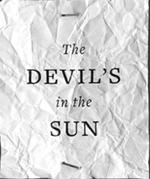
Take a bath with consecrated water from the shrine and wash away the mud of all the miles you left behind
Triplicates and wedding rings both lethal to obtain
So batten down the credit cards, the devil’s in the den
—FROM “TRANSMISSIONS FROM A LONELY ROOM”
N
EW TUNES, NEW RECORDS
, new marriage, new son.
By then, Doug Grean was my steady and stupendously creative sidekick. He helped me and the other Pilots put together a suite of songs that eventually became
Shangri-La Dee Da
. This time, as opposed to the more commercial approach of
No. 4
, the four of us agreed that we wanted to break on through the other side.
When we were done, the suits wanted us to put out, as the first single, a more pop-oriented song, “Days of the Week.” Well, to satisfy our core following, we had always led off with a rock single. We wanted “Coma,” a song that said, “Tar and feather hide your feelings, if you even know the meaning, your high road is overrated, you left your guru out there hangin’.”
Well, the suits prevailed and we were left out there hangin’ with “Days of the Week.” Our fans were disappointed and our sales flagged. No matter, we hit the road again in support of this, STP’s fifth studio record in less than ten years. If you throw in my
12 Bar Blues
, that makes six, a lot of music from someone with a screaming and demanding addiction.
Writing the music and lyrics for
Shangri-La Dee Da
was a continuation of my attempt to understand that addiction. The song “Dumb Love,” for example, tells the story:
Alcohol, it’s a lie, stimulate a needle in your eye
Let it bleed, blow your mind
Touched myself, nearly went blind
Couldn’t find a way to live through the pain …
Couldn’t get outta bed
Ten-ton bricks layin’ on my head
Persecute the crucified
Kill a man for losing his mind
Couldn’t find a way to live through the shame …
“Hello It’s Late” has a Burt Bacharach vibe and is deeply sorrowful. My marriage to Mary was young but our fights felt old. It’s a song about doubt and fear for the future. “It’s just a game we used to play,” I wrote, “and I didn’t think we’d take it all the way. It kills me just because it can’t be erased. We’re married.”
“Wonderful” has me dreaming about my death. In the next world, I envision Mary as my guide:
If I were to die this morning
Would you tell me things that you wouldn’t have?
Would you be my navigator?
Would you take me to a place where we could hide?
… I wanna ask you to forgive me
I haven’t been the best with all that I had
Wish I’d only laid beside you
I think I spread myself too thin
WHEN MARY’S DEPRESSION HIT HER HARD,
she’d say that her “black clouds” had returned. During those times when we were able to comfort each other, our bond was beautiful. In that spirit, I wrote “Black Again” for Mary:
When you’re fed up and lonely
And nothing else seems to matter really
I’ll be waiting for you
I’ll be here to hold your hand
When you’re tired and lonely
Hold your breath underwater
And know you’ll rise to the surface slowly
Think of me as a ship that might hold you
Carry you to the shore when you’re tired and lonely
The most distinctively non-love song on
Shangri-La Dee Da
was “Too Cool Queenie,” written with Ms. Cobain in mind. Mary and I happened to run into her in New York at a time when she was feuding with members of Nirvana. In an offhand fashion, I told a fanciful version of the story of her and Kurt:
There was this girl who lived not too long ago
As a matter of fact I think she lives still
She knew she could do no wrong just singing those songs
That we all knew
She would always crash the party, it was no surprise, it was for her
Too cool Queenie
There was this boy, he played in a rock ’n’ roll band
And he wasn’t half bad at saving the world
She said he could do no right, so he took his life
His story is true
… And now this girl, she got real famous
And she made lots of money and some of his too
But still she thinks she can do no wrong just playing those songs
She’s all too cool
The sales for
Shangri-La Dee Da
weren’t especially cool, and neither was the tour to support the record. However, the reviews were great. This was a new era when rock fans were going Napster. The whole band was partying hard, me included, but Dean was hiding that fact and blaming all mishaps on me. Meanwhile, I came down with a lung infection and was coughing like mad. At one point, I lost my voice. Onstage, whenever my voice failed, Dean looked over at me as if to say, “Why are you fucking up again?”
I quickly had my fill of his passive aggression.
“What’s the deal?” I said, confronting him backstage.
“You sound like shit,” he retorted.
“I sound like shit because my lungs are congested. What’s the worst thing that happens to you—you get a little blister on your finger?”
“Fuck you.”
“Fuck you!”
We were about to get physical when our sober coach—a man with a thankless task—stepped between us. There had been fights between Dean and Robert in the past—I remember them throwing chairs at each other—but Dean and I had never come to blows. This time we were inches away.
This time I also realized that I hadn’t gotten past the built-up resentment of being publicly dissed during their press conference on the
Tiny
tour. This time I realized that, once again, I wanted to retreat and find my own way.
Shangri-La Dee Da
, a title that flippantly referenced a place that was supposedly heaven on earth, turned hellacious in a hurry. Still, I think of it as our most adventurous work.
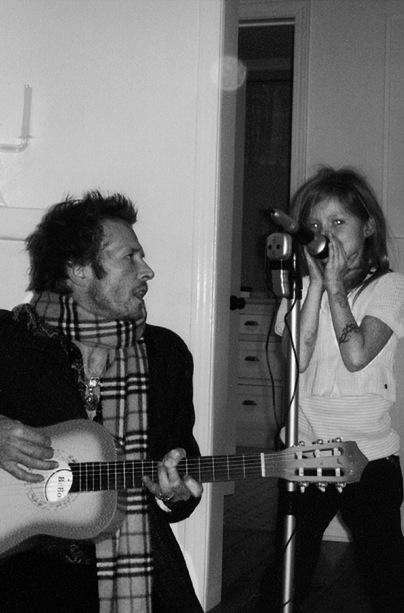
My magnificent daughter, Lucy (or Louie!)
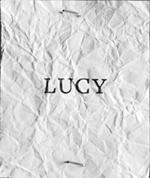
A
FTER THE SECOND BREAKUP OF STP,
I went back out on junk. Understandably, Mary was disgusted with me. Mary was clean and, not only that, Mary was pregnant with our second child. I desperately wanted to be clean and present for our daughter’s birth. I went into rehab ahead of schedule so I could get out in time. But things got screwed up and the counselors were late letting me out of treatment. Mary also gave birth ten days early. I missed the birth by thirty seconds, and I’ll regret it forever. But Lucy, beautiful Lucy, was in my arms that day, in the arms of her mother, Mary, in our arms forever.
That same year at Christmas we experienced a miracle. Compared to the dark spirits that haunted me during the reign of cocaine, this spirit of light came to our family as an absolute blessing and reminder of the power of faith.
My grammy, my mom’s mom, was sick with an infection of the brain—encephalitis. Her memory was gone. She barely recognized any of us. On Christmas Eve she was released from the nursing home and came home with us. The doctors said her chances to recover were nil.
That night we put the kids to sleep, trusting that visions of sugarplums would dance in their heads. Santa Claus did his thing, and early in the morning we gathered around the tree to open presents. Somewhere around eight a.m., Grammy came downstairs and began to call our names. She recognized every one of us—her husband, her daughter, her grandchildren, her great-grandchildren. She had perfect clarity, perfect recall. A nurse, whom I had hired to stay with her, said in all her professional life she had never witnessed this kind of recovery. Two days later, Grammy and Grandpa drove back home to Oceanside. Grammy was fine.
I learned that God and the angels of the Lord can turn around everything and revive life. Miracles happen. Of that I had no doubt. In some ways, my own nuclear family was a miracle.
It was 2002, and I seemed to have it all:
The woman I loved, the children I loved.
I was motivated to do everything I could to save the family, the marriage, the life I had long dreamed of.
I was determined.
I was strong.
I was committed.
The Cleaver Christmas family photo
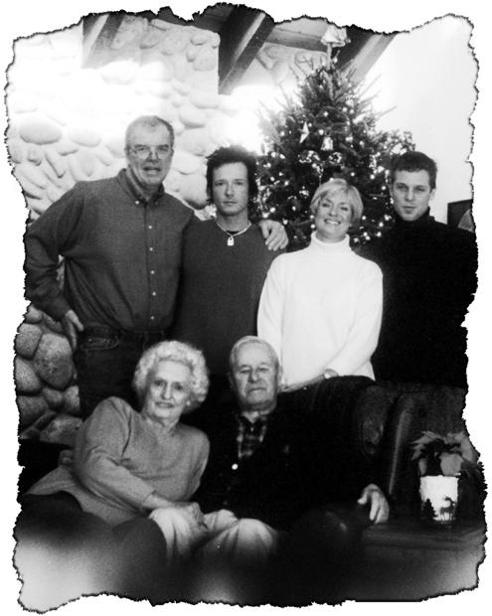
Dad Dave, Scott, Mom, Michael, Grammy, and Grandpa
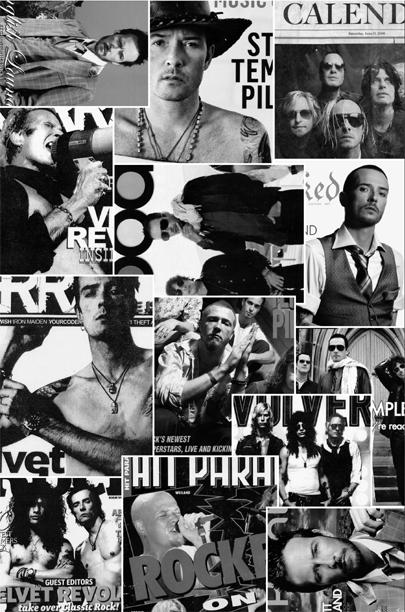

S
LIPPING AND SLIDING, PEEPING AND HIDING.
Basically, the story was that Mary had cleaned up and I hadn’t. I was strung out and fucked up. Mary wanted out of the marriage—the agony of our divorce went on for years—but Mary still took an interest in my career. Always has. Always will. Ka-ching. Ka-ching.
She said she’d been hanging with Susan McKagan, a former swimsuit supermodel and wife of Duff, the bass player with Guns N’ Roses when the group was at its height. Susan told Mary that three guys from GNR—Duff on bass, Matt Sorum on drums, and Slash on guitar—had formed a band. Initially, Izzy Stradlin was in, but soon opted out. David Kushner from Wasted Youth took his place.
“Sounds like a lot of egos,” I said. “Sounds like a lot of trouble.”
“They put some songs on a CD that they want you to hear,” Mary said. “They think you’ll like what they’re doing.”
I didn’t. It sounded like Bad Company–styled classic rock. And I never liked Bad Company. But being a nice guy, I said, “There’s some stuff that’s okay, but just send me another disc when you have a few new songs.”
A week or so later, another CD arrived with songs custom-designed for me. The tunes had STP written all over them.
Duff called and said, “Hey, man, just drop by the studio.” I knew Duff from the gym, and I said I’d try. I still wasn’t sure whether I wanted to hook up with these guys.
“Look, Scott,” Duff said, “there’s also soundtrack stuff we’ve been asked to do. And the money’s great.”

The money attracted me. My managers, pushing me to join this band, said, “They’re going to cover Pink Floyd’s ‘Money’ for a new movie called
The Italian Job
. And then Ang Lee wants songs for his remake of
The Hulk
. This is going to be a hot band. Just give it a chance.”
I reluctantly agreed. The idea was just to jam. Couldn’t hurt to see if there was any chemistry. Meanwhile, I was still hurting chemically. I was still shooting dope. That’s the reason I showed up many hours late.
When I arrived, I was shocked. The guys had set up a major industry event. All sorts of music execs were there. It was being billed as an announcement of “Guns N’ Roses with Scott Weiland” and made to look like a done deal, not just a casual jam. I was confused, and, because of my drug habit, I was also a wreck. But what the fuck, I was there and might as well sing.
We sang two songs—“Set Me Free” for
The Hulk
and the cover of “Money.” I was blown away by the powerful chemistry between us. So was everyone else. These guys attacked rock and roll like a street gang. I liked their ferocity and balls-out commitment. Besides, looking over and seeing Slash playing beside me—Slash, who’d been an idol of mine back in the eighties—was a thrill. I knew Dave Kushner from the Electric Love Hogs, an underground rock band. Back in the day, STP had aspired to be on the Love Hogs level. I remember seeing them at English Acid, a hip spot in West Hollywood. I also knew Matt Sorum from rehab; he and I had been in together.
Fact is, I had a lot in common with these guys. We’d been down the dark alleys, gotten mugged, stumbled, fell, and got back up. When I hooked up with them, they were looking good. Through martial arts, Duff had put together eight years of sobriety. Matt had six years. And Dave had over a dozen years. When they saw my strung-out condition, they vowed to do everything in their power to help.
